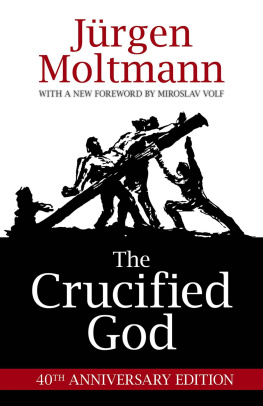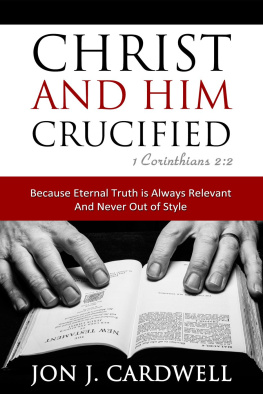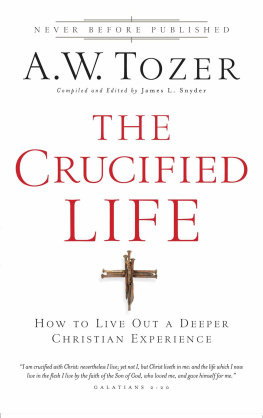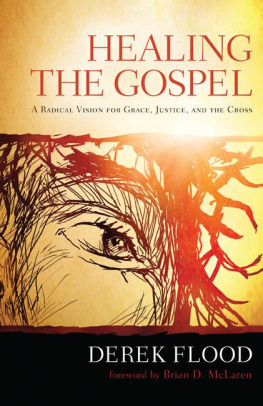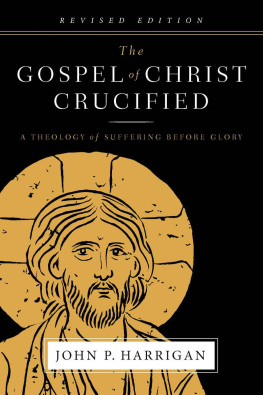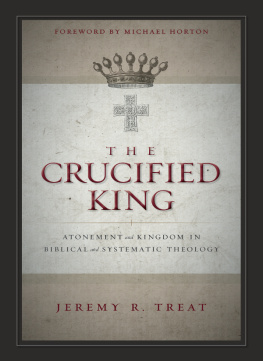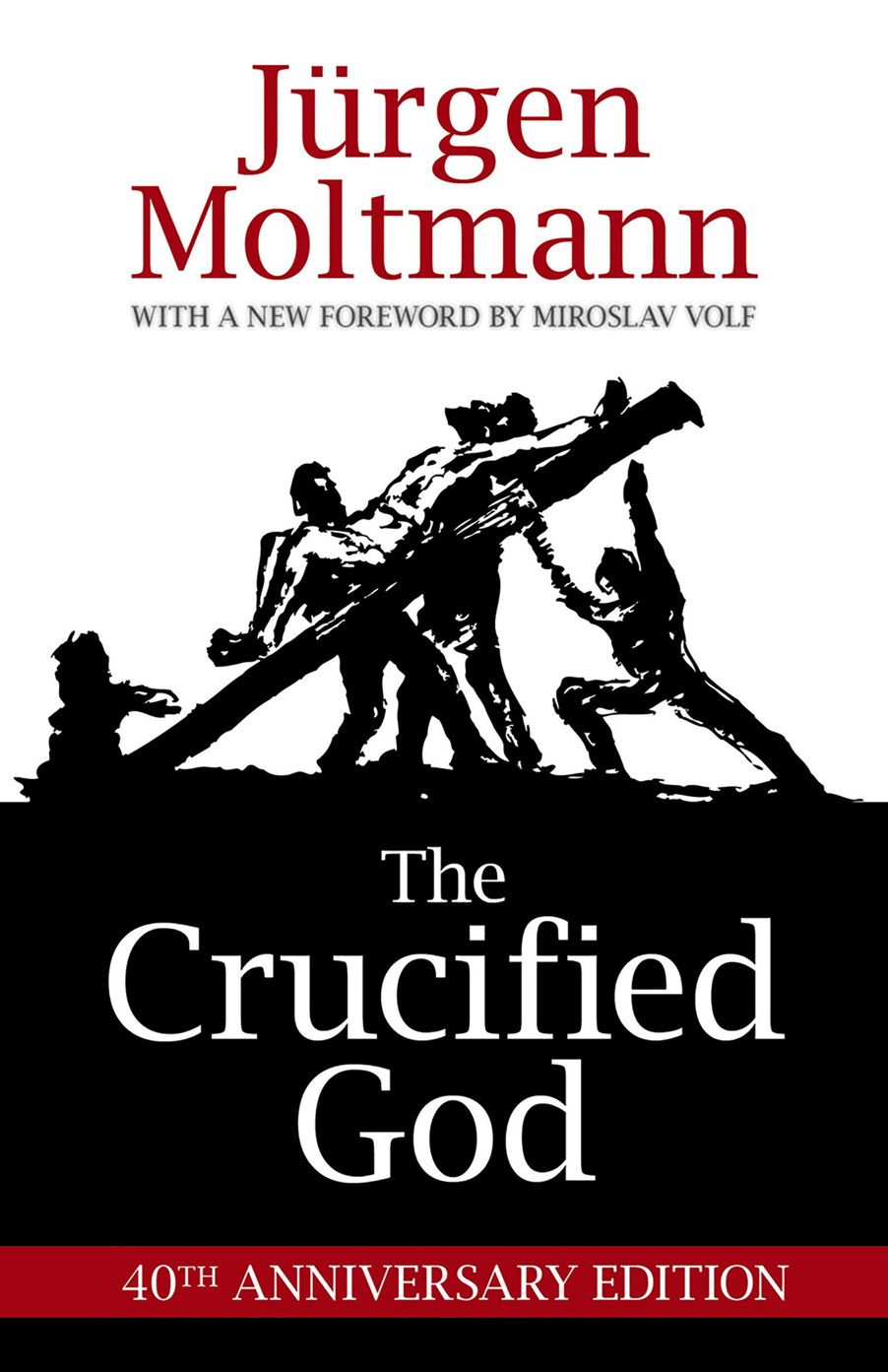The Crucified God
40th Anniversary Edition
Jrgen Moltmann
Fortress Press
Minneapolis
THE CRUCIFIED GOD
40th Anniversary Edition
Copyright 2015 Fortress Press. All rights reserved. Except for brief quotations in critical articles or reviews, no part of this book may be reproduced in any manner without prior written permission from the publisher. Visit http://www.augsburgfortress.org/copyrights/ or write to Permissions, Augsburg Fortress, Box 1209, Minneapolis, MN 55440.
Cover image: Thinkstock 2014; Crucifixion by robodread
Cover design: Alisha Lofgren
Library of Congress Cataloging-in-Publication Data
Print ISBN: 978-1-5064-0295-6
eBook ISBN: 978-1-5064-0296-3
The paper used in this publication meets the minimum requirements of American National Standard for Information Sciences Permanence of Paper for Printed Library Materials, ANSI Z329.48-1984.
Manufactured in the U.S.A.
This book was produced using Pressbooks.com.
Contents
Foreword
Miroslav Volf
Henry B. Wright Professor of Theology, Yale Divinity School
Founder and Director, Yale Center for Faith and Culture
I once visited Jrgen Moltmann at his home in Tbingen. We were in his study, and I was sitting in the chair in which I had sat many times as his doctoral student and while working on a post-doctoral thesis under his supervision. I had just been appointed as a professor at Yale, but I was still trying to puzzle out his theology. By this time, I wasnt so much trying to figure out how its different pieces fit together or how as a whole it fits into the trajectory of modern theology; I was after something less tangible: the source of its energy and power, of its ability to capture hearts as well as minds, and to do so in Asia and South America no less than in North America and his native Europe. I know of no theologian from the second half of the twentieth century who has had as powerful a global resonance as Moltmann has.
I started the part of our conversation about his theology with a deceptively simple question: Which of your books do you like the best? He paused for a brief moment, just long enough for me to wonder whether I had transgressed against some taboo, akin to the one I would have broken had I asked which of his four daughters he liked the best. Books arent children, of course, persons whom we can harm when we prefer one to the other. Still, in some ways we are our books, and revealing preferences for these public presentations of ourselves might feel uncomfortable. Not for Moltmann, I was relieved to learn. I think my best book is The Crucified God, he said slowly but without hesitation.
As I had walked up the Biesingerstrasse to his house, I had been thinking that he might opt for Theology of Hope. After all, that was the book that spelled out the eschatological orientation of his entire theology, an orientation that, with some shifts, remained constant all the way through The Coming of God, the last substantive volumethe one before the methodological finalein the series of his theological contributions. Theology of Hope was also the book that brought him international fame, and not just among theologians, as a report about the English translation of the book on the cover of the New York Times attested. Why The Crucified God? I asked him.
The Crucified God, Moltmann replied, was seminal to the next twenty years of his theological work. Theology of Hope had provided some key formal categories that he continued to employ in an altered formthe promise acquired increasingly a dimension of presence, for instance. But The Crucified God laid the Trinitarian and soteriological foundation for subsequent books, starting with The Trinity and the Kingdom. It introduced the notion of a God who suffers in solidarity with afflicted creatures and redeems them through that suffering. This simple and profound thought lies at the heart of the bookdifficult and unacceptable to many, especially among trained theologians committed to Gods impassibility, and hopeful and comforting to many more, especially among the afflicted, whether they live in fear for life in war torn cities, eke out a miserable existence in shantytowns, wait for death in the belly of cruel prisons, or struggle against an illness eating away their body or soul.
The Crucified God was published in German in 1972, when Moltmann was a forty-six-year-old professor of theology at the University of Tbingen. In a sense, though, he started writing it immediately after World War II, as a barely twenty-year-old prisoner of war. Raised as a secularist, in an English prisoner of war camp he read the New Testament and the psalms for the first time and was taken by words of Jesus on the cross, a quotation from the twenty-second psalm: My God, my God, why have you forsaken me? Young Moltmann, afflicted both by captivity and by crushing guilt, thought, Here is someone who understands me. Moltmann described this as an experience of being found by God rather than of finding God. God spoke to him with bloodied and parched lips in cries of pain and abandonment, bitter fruits of seemingly misplaced trust.
The Crucified God is theology at its best. I know some experts will complain about the inadequacies of the books account of the mystery of the holy Trinity. Moltmann addressed some of them in subsequent work. Many of his colleagues remain unpersuaded, of course, but facing contestations is in the job description of an academic theologian. Whatever one decides about the merits and demerits of Moltmanns doctrine of the Trinity in this text, the fact remains: The Crucified God is a truly great book. It is existential and academic, pastoral and political, innovative and traditional, readable and demanding, contextual and universal, deeply Christian and equally deeply humanand all of this in explicating the bearing of the central Christian theme (the crucifixion of Jesus of Nazareth) on a fundamental human experience (suffering).
Academic theology is in crisis today. Theological schools are closing, theological books are not being read, and the discipline itself has lost much of its reputationamong academics working in other fields, among ministers and their flock, and among the general population. There are many reasons for the present crisis of theology, but one of them is certainly that academic theologians have been trained out of doing theology the way Moltmann has done it in many of his writings, and especially in The Crucified God. As many theologians struggle to find their bearings, this book is one shining exemplar of a theology that is alive and powerful.
Preface to the Paperback Edition
The theological foundation for Christian hope is the raising of the crucified Christ. Anyone who develops a theology of hope from this centre will be inescapably reminded of the other side of that foundation: the cross of the risen Christ. So after publishing Theology of Hope, the logic of my theological approach led me to work more deeply on the remembrance of the crucified Christ. Hope without remembrance leads to illusion, just as, conversely, remembrance without hope can result in resignation.
Of course I had not planned this. I was led to the theology of the cross through reactions to Theology of Hope and, even more, through personal participation in the sufferings of those years. Wherever Christian hope makes people active and leads them into the creative discipleship of Christ, the contradictions and confutations of the world are painfully experienced. When freedom is near the chains begin to chafe. One begins to suffer with the victims of injustice and violence. One puts oneself on the side of the persecuted and becomes persecuted oneself. In the years between 1968 and 1972 I discovered something of this both personally and politically. At that time the suffering of friends living under Stalinism in Eastern Europe and under military dictatorships in Latin America and South Korea moved me deeply. In 1970 I wrote,
Next page

